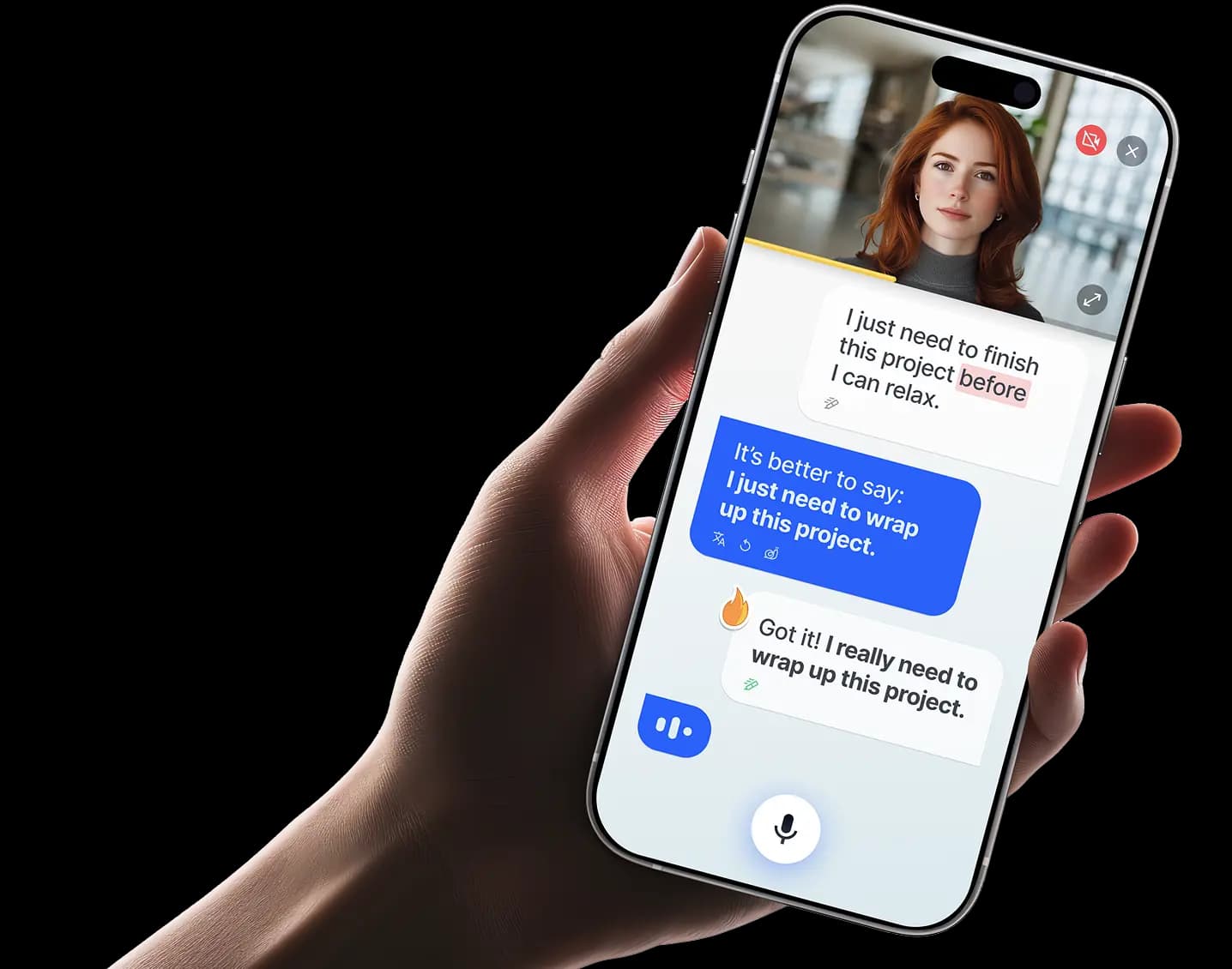Refine Common Topics in English for Interview Settings

Interview sessions are often quite the experience. For most people, there are moments when your heart pounds, your palms sweat a little, and the simplest interview question feels like a trap. Perhaps, it’s in such a moment you’d remember how out of reach English for interview practice often feels for many people.
You don’t get enough real-world speaking chances (unless you take interviews for a living), and the few tutoring sessions you find are expensive or clash with your schedule. You worry about mixing up words or freezing up under pressure, and most generic guides don’t hit the mark for your specific role.
This article explores key topics tailored to interview settings, practical exercises you can fit into your day, and low-cost strategies to build real confidence. By focusing on the right content and smart practice, you’ll turn nervous energy into clear, steady speech when it matters most.
Key takeaways
In this guide, you’ll find the following key points:
- A highlight of the challenges job seekers face when preparing and appearing for an interview
- A breakdown of key interview topics, including common questions, sample answers
- Loora’s unique approach to effective interview practice
- Helpful tips to note for speaking English most effectively at an interview
Understanding job interview anxiety and challenges
Picture this: the hiring manager asks a simple question in the job interview session. Your mind blanks immediately and your chest tightens.
That feeling isn’t just “nerves”, it’s anxiety that can block you from showing your true potential. You might replay every misstep in your head for days, telling yourself you’re not good enough.
No matter what level you are in English-speaking, hidden mental blocks can mute even the most talented voices and cost you not only the job but the promotion you’ve earned.
Emotional barriers wear many masks: the fear that a single slip marks you unprofessional, the painful habit of comparing yourself to others, even the awkwardness of abrupt silence drives you to pepper your speech with “um” and “ah.”
Each worry leads to the next: “What if I mess up?” then, “What if I freeze again?” Your heart pounds, your words stumble; you start avoiding eye contact and one slip makes you even more nervous.
Dig a little deeper, and you might remember telling yourself that making mistakes meant you were not good enough, or you might feel the sting of a past interview that went badly. Those memories flood your body with stress and turn a simple chat into a panic.
But you can break free. With Loora’s gentle guidance, you can learn how to become quietly confident. Try simple steps: breathe slowly, see silence as a break instead of a gap, and quieten that inner critic. Before you know it, your real voice will come back.
Speaking with calm confidence does more than help when undergoing an interview in English. It shows you’re ready to lead, and that opens doors to promotions, new roles, and connections that value your clear, steady voice. Find what holds you back, use the right tools, and step into interviews ready to shine.
How Loora can help you speak English confidently
Ever wish you had more quiet times talking about interview practices without judgments? Meet Loora, your AI conversation partner that’s available 24/7.
With Loora, every practice session feels like a friendly chat. ESL learners can pick the interview topic, and Loora throws real job interview English questions at them. It listens, gently points out where you hesitate, and shows you the clearer path. No more sweaty‑palmed guesswork.
Loora’s magic lies in instant feedback. Stumble on a tricky phrase? Loora highlights it, offers a better option, and even explains why. It’s like having a language coach in your pocket, minus the hefty price tag and rigid schedule.
Best of all, you practice on your own terms. Waiting for a human tutor can feel off especially when you’re busy; Loora AI tutor never makes you wait. You get to run through sample answers during your lunch break, right before bed, or while you wait for the bus. Each chat builds confidence, sharpens your responses, and tames those interview jitters.
Simple and endlessly patient, Loora turns every “uh‑oh” moment into a chance to level up. Speak up, lean in, and watch your English and your career steadily take off.
Practical tips for improving your English interview skills
Before you take an English interview, it helps to have a clear plan for practice. In the next section, you’ll find six key areas to focus on. Each area includes real questions you might face, sample answers to model, simple daily drills, and quick ways to fit practice into your busy day:
Professional background
This section helps you turn your work history into a clear, engaging story. You’ll learn how to highlight your best achievements without rambling
Common questions
You’ll often hear, “Tell me about yourself” or “Walk me through your resume.” These questions give you a chance to highlight your experience in a clear, simple story.
Sample answers
Start with your role, then share one key achievement. For example, “I spent five years in marketing at X Company, where I led social media campaigns that increased engagement by 30%.” Keep it short and focused on facts.
Daily practice technique
Do your research and choose one common interview question each morning. Record yourself answering it in sixty seconds and prompt Loora with the questions to get more detailed feedback. Repeat the process, aiming for smoother flow.
During breakfast, play your recordings and mentally adjust any rough spots. On your commute, rehearse the same answer in your head, picturing a calm, confident tone.
Skills and strengths
Here, you’ll find ways to pick and present your top skills in a way that feels natural. You’ll practice giving examples that back up your claims:
Common questions
English job interview personnel often ask, “What are your top strengths?” or “Which skill makes you a good fit for this job?” These let you showcase what sets you apart.
Sample answers
Pick one strength and back it up with an example. You might say, “I’m highly organized. Last quarter, I managed ten projects at once and met every deadline by using detailed checklists.” Speak slowly and clearly.
Daily practice technique
Each evening, write down two strengths with a short example. The next morning, include them into chat prompts in the Loora application to practice their usage. Another great idea is imagining giving your answer confidently in an interview room before lights out. This technique builds muscle memory so you can answer without thinking too hard.
Weaknesses and challenges
Learn to speak honestly about areas you’re improving. You’ll learn to present each area you’re working on as an opportunity for growth, rather than a flaw.
Common questions
You’ll face questions like “What is your biggest weakness?” or “Tell me about a time you failed.” They test honesty and growth.
Sample answers
Frame a weakness as a learning story. For instance, “I used to avoid public speaking, so I joined a local club. Now I lead monthly presentations.” Keep the tone positive and show progress.
Daily practice technique
Record a thirty‑second story about a challenge and how you overcame it. Play it back and look for any rushed words. Pair that with one-on-one conversation with the Loora AI tutor and practice until it sounds calm and clear.
Motivation and goals
This part guides you in explaining why the job matters to you and where you want to go next. You’ll practice clear, concise statements that show your passion:
Common questions
Ask yourself how you’d answer, “Why do you want this job?” or “Where do you see yourself in five years?” These questions reveal your drive and fit.
Sample answers
State your reason clearly: “I admire your company’s mission to innovate in healthcare, and I want to contribute my project‑management skills.” For your future plan, link it to the role: “In five years, I hope to lead a small team on similar projects.”
Daily practice technique
Draft a two‑sentence “why” statement each day. Read it aloud until it feels natural in conversation. Then, write a new version of your five‑year plan each evening, refining your wording.
Behavioral questions
Discover how to use real examples to prove your problem‑solving and teamwork skills :
Common questions
Behavioral prompts often start with “Tell me about a time you…” They ask for real examples of how you handle situations.
Sample answers
Use the STAR method to give general answers. Describe the Situation, the Tasks you faced, the Action you took, and the Result you achieved. For example, “When a client suddenly changed scope (Situation), I organized a quick team meeting (Action), reset expectations (Task), and delivered on time, boosting client satisfaction by 20% (Result).”
Daily practice technique
Write one STAR story each day for different scenarios. It could be problem solving, conflict resolution, teamwork. Speak it aloud to check for natural pacing.
Questions for the interviewer
Prepare thoughtful questions that show your curiosity and enthusiasm to the interviewer. You’ll learn to ask in a confident, conversational way:
Common questions to ask
Prepare questions like “What does success look like in this role?” or “How would you describe the team culture?” These show your interest and help you learn more.
Sample approach
Phrase them naturally: “Can you share an example of a recent project success?” or “What growth opportunities exist here?” Keep your tone curious and respectful.
Daily Practice Technique
Each morning, list three questions you might ask. Practice saying them as if you’re in the interview, focusing on a steady pace. You can use the Loora AI tutor feature to get feedback on details like pacing, tone and pronunciation.
Writing down your top questions while you plan your to‑do list is also a top idea. Before sleeping, imagine asking them and listening to the answers.

Loora’s unique approach to mastering English for interviews
Loora is both a cheerleader and a coach for whenever you need to practice. You’ll get instant, friendly feedback without any judgment.
Why Loora rocks your prep
- Fast feedback: Slip on a phrase? Loora spots it instantly, offers a better line, and even explains why it works.
- 24/7 practice buddy: No scheduling headaches. Run through mock questions at 6 a.m. or midnight. Loora never snoozes.
- Custom interview scenarios: Pick your industry, role, or even nightmare questions. Loora adapts on the fly, so you’re never caught off guard.
Daily drill mechanics
- Pick your topic: Open the app and choose “Role-Plays”→”Job Interview".
- Set a 5‑minute timer: Focus on one question. No need for marathon sessions.
- Speak and listen: Answer out loud. Loora records, then highlights stumbles and filler words.
- Learn and repeat: Read Loora’s tip, try the question again. Watch your confidence stack up.
In just five minutes a day, you turn every “uh‑oh” moment into a mic‑drop answer. It might feel a little different when you see your own mistakes in black and white, but you’re to get some gentle AI-powered coaching that turns every sentence into a winner.
With Loora, you’re not just memorizing answers; you’re rewiring your brain to speak with calm, clear authority when it counts.
Tips on integrating Loora into your job preparation routine
Incorporating English language practice into your daily job prep doesn’t have to be hard. With Loora, you can squeeze in quick, focused sessions anytime. The tips below show you how to make Loora a seamless part of your routine so you build steady confidence without adding stress.
Start your day with a quick Loora check-in
Begin each morning by speaking with Loora for just five minutes. You’ll warm up your mouth muscles, spot weak spots right away, and acquire the ability to work on them in record time.
Use Loora during breaks at work or study
When you have a short break waiting for coffee, walking between meetings, or standing in line, launch Loora on your phone. Spend three minutes answering a behavioral question, such as “Tell me about a time you solved a problem.” Loora’s instant feedback will show you where to tighten your story. Over time, these task-feedback loops will eradicate mistakes and build up your confidence
Turn your commute into practice time
If you use public transport or carpool, turn that time into an English lab. Ask Loora to role-play a mock interview. Speak your answers aloud and let Loora record. After your ride, review the highlights: check for filler words and notice pace. You’ll arrive ready, having practiced real questions in a real situation.
End your day with reflection and replay
Before bed, spend five minutes replaying your Loora session from earlier. Listening to your answers and reading Loora’s tips about them helps significantly. Note one thing you improved and one you’ll focus on tomorrow. This reflection makes progress stick, so each day’s practice builds clearly on the last.
Schedule weekly deep-dive sessions
Once a week, block out 20 minutes in your calendar for a full mock interview with Loora. Choose a set of five to seven questions, switch between topics like strengths, weaknesses, and goals, and treat it like the real thing.
Afterward, review the full session and save your best answers to share with a friend or coach for extra feedback. This in-depth session pulls together daily habits into a strong, solid routine.
Got questions? Below you’ll find clear, simple answers to the most common concerns about practicing English for interviews with Loora.
How can I practice English interviews if I’m pressed for time?
Focus on short, high‑impact drills. Pick one question and spend a minimum of three minutes a day with Loora. Answer out loud, review the feedback, and try again. Even tiny, daily bursts like during your morning coffee or between meetings add up to real progress.
What are common mistakes people make in English interviews and how can I avoid them?
Many candidates overuse filler words (“um,” “uh”), speak too fast, or give long, unfocused answers.
To avoid this, use Loora to record your responses. It will flag fillers, slow your pace, and coach you to keep answers clear and concise.
Can improving my English fluency with AI really build my confidence?
Yes. AI applications like Loora give instant, unbiased feedback. Each time you practice and see your own improvement, you reinforce positive habits. That steady progress turns nerves into confidence so by your real interview, you’ll feel prepared and calm.
How personalized is the feedback provided by Loora?
Loora adapts to your skill level and goals. If you work in marketing, tech, or finance, it will suggest vocabulary and phrasing that match your field. It also tracks your history, so it focuses on your unique patterns like your most common mistakes rather than giving generic tips.
Can Loora help with industry-specific English language requirements?
Absolutely. You can choose your industry or role before you start practicing. Loora then uses real interview questions and answers in English, so you learn the right terms and speak with the exact style employers expect.
How often should I practice to see noticeable improvements?
Aim for consistency over duration. Even five minutes a day with Loora will bring results in two to three weeks. If you can, add one weekly deep‑dive session of 20 minutes. This mix of daily drills and longer reviews keeps your skills sharp and builds real confidence.
Engage in personalized conversations with Loora, the most advanced AI English tutor, and open doors to limitless opportunities.
